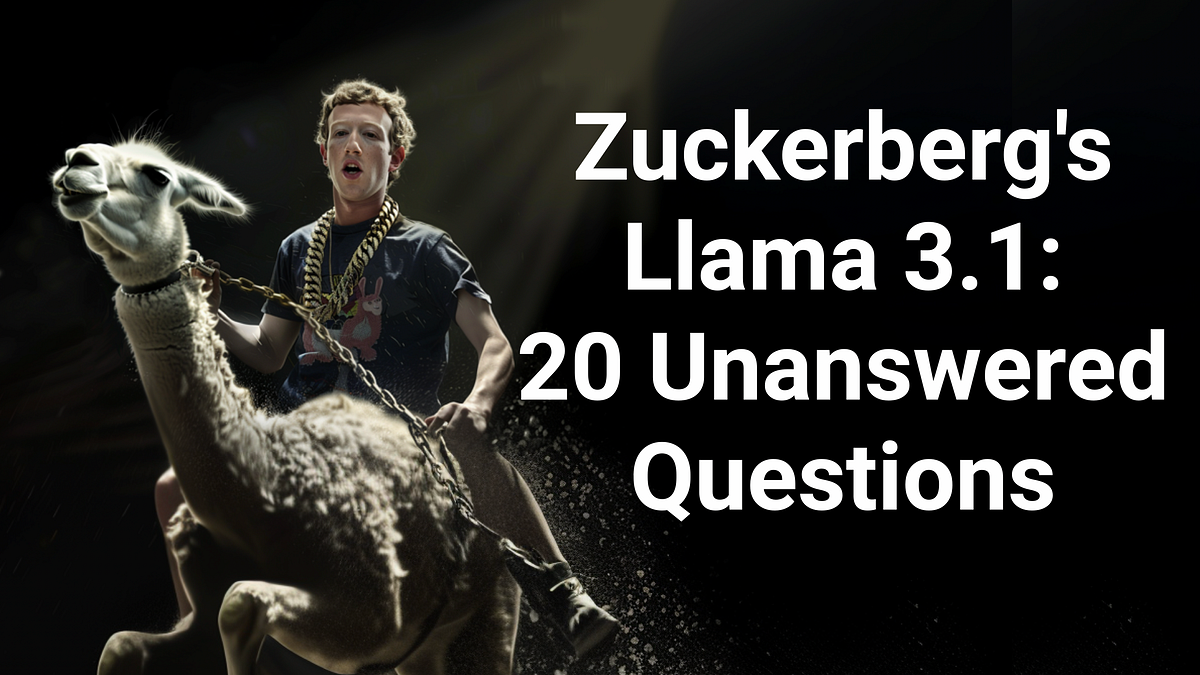Zuckerberg’s Llama 3.1: 20 Unanswered Questions

🌈 Abstract
The article discusses the release of Llama 3.1, a powerful AI model, by Mark Zuckerberg and Meta. It raises several critical questions and concerns around this release, including:
🙋 Q&A
[01] Price Dumping, Market Power Abuse, and Competitive Edge
1. Questions related to the content of the section:
- Is it acceptable for one of the world's wealthiest individuals, Mark Zuckerberg, to engage in price dumping to eliminate competition in the crucial AI industry, thereby gaining even more control over global information?
- Isn't the forced bundling of Meta AI into Facebook, Instagram, and WhatsApp a new form of market power abuse?
- How does giving away the latest US AI technology not amount to surrendering the country's competitive edge?
[02] Misuse Prevention and Open Source Risks
1. Questions related to the content of the section:
- How exactly will Meta ensure that malicious actors don't exploit Llama for harmful purposes?
- How does Meta plan to address the concerns raised by AI thought leaders about the risks of open-source AI, such as the inability to control or patch unsecured models once released?
[03] Outsourcing Problems, Legal Concerns, and EU Embargo
1. Questions related to the content of the section:
- Is it acceptable for Meta to outsource any potential problems to the world?
- Given that Llama was trained on copyrighted materials without permission, are these models even legal?
- Meta has said it would embargo Llama 3.1 in Europe. How exactly will it guarantee that if the models are freely available?
[04] Data Exploitation, Oversight and Control, and Democracy Risks
1. Questions related to the content of the section:
- With Meta users unable to opt out of their data being exploited, isn't this a new peak of monopsony abuse of power?
- Should a company exist as a single entity controlled by one person with no effective oversight, possessing information about most of humanity through its social media dominance and now the most widely distributed AI?
- Meta's social media platforms allow fake political ads, thereby enabling false interference in democratic elections. Does adding AI dominance increase or decrease the risk of undermining democracy?
[05] Role of Governments, Privacy Issues, and Ethical AI Development
1. Questions related to the content of the section:
- Is it acceptable for one individual, Mark Zuckerberg, to decide international AI strategy and ignore regulatory efforts by global governments?
- How will Meta address the privacy concerns associated with the widespread deployment of Llama, especially given their track record with user data?
- What steps is Meta taking to ensure ethical AI development and deployment, and how transparent are these processes to the public?
[06] International Security, Model Reliability, and Future AI Agents
1. Questions related to the content of the section:
- Given Meta's decision to allow access to their AI models by Chinese developers, how does this align with US foreign policy and national security concerns?
- With platforms like Hugging Face hosting hundreds of thousands of AI models, who is responsible for ensuring their safety and reliability? How can users trust these models if developers assume no liability?
- As AI agents begin to take autonomous actions within IT systems, what risks does this pose, especially with unsecured AI? How can users ensure these systems are safe and reliable?
[07] Public Trust, Innovation vs. Safety, and AGI
1. Questions related to the content of the section:
- How does relieving unsecured AI developers of liability affect public trust in AI technologies? Shouldn't accountability be crucial for building this trust?
- Can a balanced approach be found that fosters innovation while implementing necessary safeguards to mitigate risks? Shouldn't this approach include transparent disclosure practices, robust regulatory frameworks, ethical guidelines, and mechanisms for accountability and oversight?
- Experts believe superhuman intelligence or AGI is possible in a median time of 5 years. No one knows exactly what that will mean or if humans will still be able to control their destinies thereafter. Is it wise to continually release the latest AI tech with no oversight and no plan for when AGI comes?
Shared by Daniel Chen ·
© 2024 NewMotor Inc.